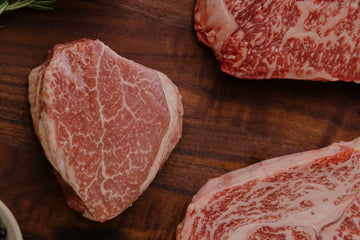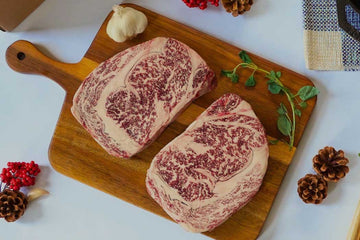
When it comes to choosing the beef you put on your plate, there are two primary options: buying it from a local farm or purchasing it from a grocery store. While both choices provide a source of meat, they come with distinct advantages and disadvantages. In this blog, we'll explore the key differences between these two options, emphasizing the health benefits of buying beef locally, the importance of supporting local farmers, and how you can build a meaningful relationship with your local farmer.
Health Benefits of Buying Beef Locally
-
Fresher and More Nutrient-Dense Meat: Local farmers often prioritize the well-being of their animals and the quality of their meat. Beef from local farms is typically fresher because it doesn't go through the same long transportation and storage processes as grocery store meat. This results in a higher nutrient content, including vitamins, minerals, and healthy fats, making it a more nutritious choice for your family.
-
Lower Risk of Contaminants: Local farms tend to have more control over their production processes and animal welfare standards. This lower-scale, hands-on approach often translates to fewer instances of contamination and antibiotic use in the animals, reducing the risk of harmful residues in your beef.
-
Transparency in Sourcing: When you buy beef locally, you have the opportunity to learn about the farm's practices, including their animal husbandry, feeding methods, and any potential use of hormones or antibiotics. This transparency allows you to make more informed decisions about the beef you consume.
Supporting Local Farmers
-
Boosting the Local Economy: Purchasing beef from local farms contributes to the growth of your community's economy. It supports the livelihoods of farmers and their families, helping to sustain rural areas and preserving the agricultural heritage of your region.
-
Reducing Environmental Impact: Local beef production often has a smaller carbon footprint compared to the industrial-scale operations supplying grocery stores. Shorter transportation distances and more sustainable farming practices can help decrease greenhouse gas emissions and minimize environmental harm.
Building a Relationship with Your Local Farmer
-
Face-to-Face Interaction: One of the most rewarding aspects of buying beef locally is the chance to interact directly with the people who raise the animals and produce your food. This personal connection fosters trust and allows you to ask questions, share feedback, and gain a deeper understanding of their farming practices.
-
Customization and Special Requests: Local farmers are more likely to accommodate special requests and provide customized cuts of beef to meet your specific preferences. Building a relationship with your farmer opens the door to tailoring your meat purchases to suit your needs.
Downsides of Grocery Store Meat
-
Unknown Origins: Grocery store meat often comes from large-scale, centralized processing facilities, making it difficult to trace the source of the meat or learn about the conditions in which the animals were raised. This lack of transparency can be concerning for consumers.
-
Quality and Handling: Mass-produced meat may be subjected to extensive processing, including additives, preservatives, and excessive handling. This can compromise the overall quality and taste of the beef.
-
Environmental Impact: The industrial production of meat for grocery stores is associated with environmental concerns, including deforestation, water pollution, and overuse of antibiotics, which contribute to antibiotic resistance.
Here at Wilders, we're an open book, and we can attest that buying beef from a local farm offers numerous advantages. Local farms offer fresher and more nutritious meat and the opportunity to establish a personal connection with those who produce your food. Grocery store meat can come with uncertainties about sourcing, quality, and environmental impact. Ultimately, the choice between the two options depends on your values, priorities, and the importance you place on knowing where your food comes from. By choosing to buy beef locally, you not only enjoy health benefits but also become an integral part of your community's sustainable and resilient food system.











